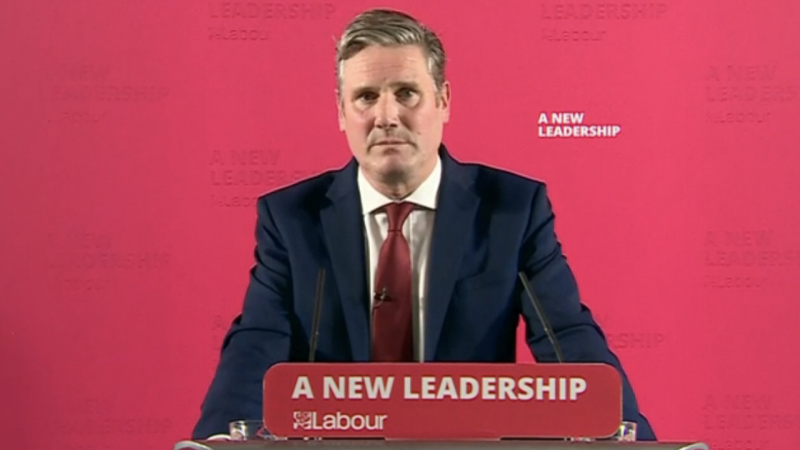'Starmer’s personal choice of ‘Stronger Together’, replicating Hillary Clinton’s failed presidential bid as a slogan, is incongruous to what is taking place within his party'.

Liam Barrett is a Constituency Labour Party Youth Officer. He tweets here.
The art of the slogan has generally been considered an effective tool to catch voters’ attention. The definition of a slogan outlines its role as a “memorable motto” that must be concise and adaptable as a marketing technique. Nevertheless, Labour’s current slogan, “Stronger Together” is an allegory of its present situation post-Corbyn and why its failing to speak to the electorate.
The party’s direction under Keir Starmer has garnered a mixed reception thus far. The leader has faced calls to commit to popular policies, be stable when challenging the government and prepare to stifle the disunity that is perpetual within the party rank-and-file. From the left, his management skills have come under scrutiny for being insipid and lacking in substance. From the right, there’s a consensus among his supporters that urge him to be resolute in condemning their left-wing rivals. Labour’s approval ratings have seen a relative uptick in recent weeks, not due to diligent opposition, but because of the government’s own debacle with recent sleaze allegations. It has shown that Starmer still comes across timid when advertising his party as a force to be reckoned with whilst the Tories flounder in panic.
A report outlined by Labour in Communications, a network of public relations experts from across the communications sector, recommended a “pledge card” to keep Labour’s messaging short yet effective to appeal to voters. Taking notes from Blair’s 1997 campaign, the card would showcase five key policies under a Labour government that would coincide with a more extensive manifesto. This isn’t a terrible idea, but with a pledge card comes a flexible and unmissable slogan.
The wise use of a slogan has been largely successful for winning electoral campaigns. Harking back to the contentious 2000 presidential election, the winning George Bush campaign’s cries for “compassionate conservatism” resonated with the wider American public as a unifying slogan. Conflating compassion with typically inequality-inducing conservatism was a targeted ploy, albeit a falsehood, to cement Republicans as committed to alleviating the disadvantaged via free markets.
Meanwhile, Tony Blair’s win in 1997 was heralded by a thematic slogan and soundtrack. “Labour’s coming home” was regularly advertised to promote New Labour’s era-defining image as a shift in Labour’s focus from socialism to Third Way centrism. The song ‘Things Can Only Get Better’ by D:Ream was repeatedly played at Blair’s stump rallies, incorporating the millennial Britpop hype into politics. Since Blair, recent branded slogans have been used to stoke division and polarisation across the electorate to win. Boris Johnson’s “get Brexit done” phrase in 2019 was symbolic of his hard Brexit ideology after he promised to deliver Britain’s withdrawal from the EU after a gruelling period. The remain vs. leave argument had upended British politics since the referendum result in 2016, but Johnson used this to his advantage to appease angry Leave voters and exhausted Remainers.
Not dissimilar to Johnson’s bedfellow across the pond, a hostile Donald Trump was notorious for his slogan to ‘Make America Great Again’, highlighting the burgeoning sentiment of anti-immigration and illiberal values across flyover America. The MAGA campaign, as its most commonly known, was considered hate-fuelled and an illusion to what a great America looked like. Trump went to war with metropolitan America and empowered the white working-class to perceive his vision as one that would solely benefit them.
Past slogans have been labelled divisive or defining, but whether we want to admit to it or not, they have been successful in achieving electoral outcomes. Starmer’s personal choice of ‘Stronger Together’, replicating Hillary Clinton’s failed presidential bid as a slogan, is incongruous to what is taking place within his party. ‘Stronger Together’ has not been enough to appease exasperated Labour members battling with each other, nor has it thwarted the leaders’ office aim to purge its socialist critics.
Jeremy Corbyn’s brand of ‘For the Many Not the Few’ looked beyond Labour’s sectarianism and outlined a manifesto fit for all. This slogan cemented Corbyn’s tenure as transformative when not being slandered by the press. It was a disarming marketing scheme that stripped the Tories of their majority in 2017 and saw Labour achieve its highest improvement since 1945. Corbyn’s leadership proved how a slogan doesn’t necessarily have to be the winning ticket but can be thought-provoking and essential to the right cause.
Starmer maintains that his leadership will ensure the party looks outwards. However, this isn’t working when a slogan does little to spark assurance from political analysts. For him to rectify his image to one that’s unifying and firm, a new and improved slogan would suffice. Maybe one chosen by the people to promote party democracy could be favourable, although ironic, or one that’s fitting to the party’s several factions. Without one, a chance at governing could be a long way off for Labour.
Left Foot Forward doesn't have the backing of big business or billionaires. We rely on the kind and generous support of ordinary people like you.
You can support hard-hitting journalism that holds the right to account, provides a forum for debate among progressives, and covers the stories the rest of the media ignore. Donate today.



